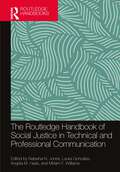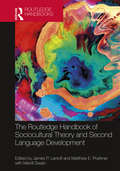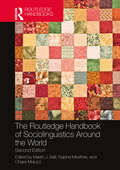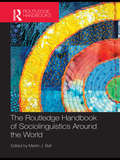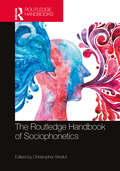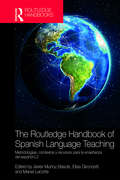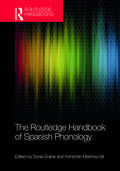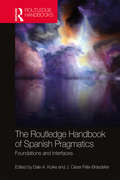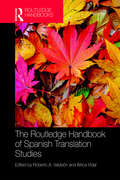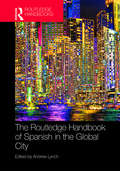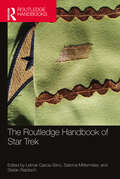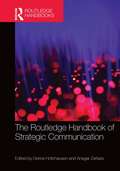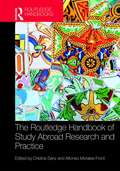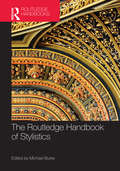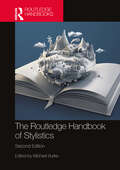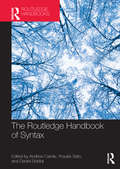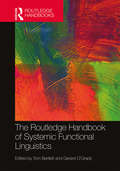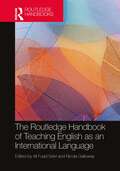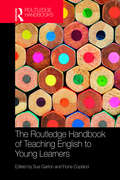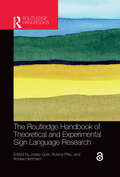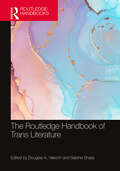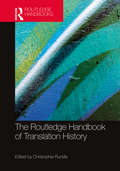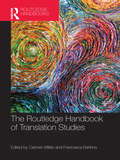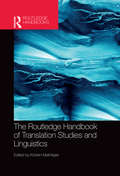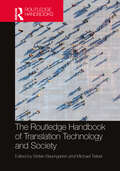- Table View
- List View
The Routledge Handbook of Social Justice in Technical and Professional Communication (Routledge Handbooks in Communication Studies)
by Laura Gonzales Miriam F. Williams Natasha N. Jones Angela M. HaasThis handbook interrogates and illustrates contemporary approaches to technical and professional communication (TPC) by focusing on emerging issues in the field. Using a social justice-centered approach, the handbook provides a view of the current state of the discipline and highlights emerging directions and perspectives that will influence the trajectory of the field in the coming years. It is divided into five interrelated parts: Disciplinarity Pedagogy Practice Social Change Intersections: Cultures and Communities Acknowledging that TPC is always embedded and participating in specific power structures, The Routledge Handbook of Social Justice in Technical and Professional Communication offers readers a way forward, a future imagined and re-imagined, and presents scholarship that is progress-in-process for TPC. Providing frameworks and strategies for embracing a social justice-driven approach, this handbook will be of interest to scholars, teachers, administrators, community leaders, and workplace and industry practitioners in the field of TPC.
The Routledge Handbook of Sociocultural Theory and Second Language Development (Routledge Handbooks in Applied Linguistics)
by Merrill Swain James P. Lantolf Matthew E. PoehnerThe Routledge Handbook of Sociocultural Theory and Second Language Development is the first comprehensive overview of the field of sociocultural second language acquisition (SLA). In 35 chapters, each written by an expert in the area, this book offers perspectives on both the theoretical and practical sides of the field. This Handbook covers a broad range of topics, divided into several major sections, including: concepts and principles as related to second language development; concept-based instruction; dynamic assessment and other assessment based on sociocultural theory (SCT); literacy and content-based language teaching; bilingual/multilingual education; SCT and technology; and teacher education. This is the ideal resource for graduate students and researchers working in the areas of SLA and second language development.
The Routledge Handbook of Sociolinguistics Around the World
by Rajend Mesthrie Martin J. Ball Chiara MeluzziDrawing on examples from a wide range of languages and social settings, The Routledge Handbook of Sociolinguistics Around the World was originally the first single-volume collection surveying the current research trends in international sociolinguistics. This new edition has been comprehensively updated and significantly expanded, and now includes more than 50 chapters written by leading authorities and a brand-new substantial introduction by John Edwards. Coverage has been expanded regionally and there is a critical focus on Indigenous languages. This handbook remains a key tool to help widen the perspective on sociolinguistics to readers interested in the field. Divided into sections covering the Americas, Asia, Australasia, Africa, and Europe, the book provides readers with a solid, up-to-date appreciation of the interdisciplinary nature of the field of sociolinguistics in each area. It clearly explains the patterns and systematicity that underlie language variation in use, along with the ways in which alternations between different language varieties mark personal style, social power, and national identity. The Routledge Handbook of Sociolinguistics Around the World is the ideal resource for all students in undergraduate sociolinguistics courses and for researchers involved in the study of language, society, and power.
The Routledge Handbook of Sociolinguistics Around the World: A Handbook
by Martin J. BallDrawing on examples from a wide range of languages and social setting, The Routledge Handbook of Sociolinguistics Around the World is the first single-volume collection surveying current and recent research trends in international sociolinguistics. With over 30 chapters written by leading authorities in the region concerned, all continents and their respective regions are covered. The book will serve as an important tool to help widen the perspective on sociolinguistics to readers of English. Divided into sections covering: The Americas, Asia, Australasia, Africa and the Middle East, and Europe, the book provides readers with a solid, up-to-date appreciation of the interdisciplinary nature of the field of sociolinguistics in each area. It clearly explains the patterns and systematicity that underlie language variation in use, as well as the ways in which alternations between different language varieties mark personal style, social power and national identity. The Routledge Handbook of Sociolinguistics around the World is the ideal resource for all students on undergraduate sociolinguistics courses and researchers involved in the study of language, society and power. English Language and Linguistics / Sociolinguistics
The Routledge Handbook of Sociophonetics (Routledge Handbooks in Linguistics)
by Christopher StrellufThe Routledge Handbook of Sociophonetics is the definitive guide to sociophonetics. Offering a practical and accessible survey of an unparalleled range of theoretical and methodological perspectives, this is the first handbook devoted to sociophonetic research and applications of sociophonetics within and beyond linguistics. It defines what sociophonetics is as a field and offers views of what sociophonetics might become. Split into three sections, this book: • examines the suprasegmental, segmental, and subsegmental units that sociophoneticians study; • reveals the ways that sociophoneticians create knowledge and solve problems across a range of theoretical and practical applications; • explores sociophonetic traditions around the world in spoken and signed languages; • includes case studies that demonstrate sociophonetic research in action, which will support and inspire readers to conduct their own projects. This handbook is an indispensable resource for researchers, undergraduate and graduate students in sociophonetics, as well as researchers and students in sociolinguistics, phonetics, phonology, language variation and change, cognitive linguistics, psycholinguistics, speech pathology, and language teaching—and indeed any area of study where phonetics and phonology interact with social factors and forces.
The Routledge Handbook of Spanish Language Teaching (Routledge Spanish Language Handbooks)
by Javier Muñoz-Basols Manel Lacorte Elisa GironzettiThe Routledge Handbook of Spanish Language Teaching: metodologías, contextos y recursos para la enseñanza del español L2, provides a comprehensive, state-of-the-art account of the main methodologies, contexts and resources in Spanish Language Teaching (SLT), a field that has experienced significant growth world-wide in recent decades and has consolidated as an autonomous discipline within Applied Linguistics. Written entirely in Spanish, the volume is the first handbook on Spanish Language Teaching to connect theories on language teaching with methodological and practical aspects from an international perspective. It brings together the most recent research and offers a broad, multifaceted view of the discipline. Features include: Forty-four chapters offering an interdisciplinary overview of SLT written by over sixty renowned experts from around the world; Five broad sections that combine theoretical and practical components: Methodology; Language Skills; Formal and Grammatical Aspects; Sociocultural Aspects; and Tools and Resources; In-depth reflections on the practical aspects of Hispanic Linguistics and Spanish Language Teaching to further engage with new theoretical ideas and to understand how to tackle classroom-related matters; A consistent inner structure for each chapter with theoretical aspects, methodological guidelines, practical considerations, and valuable references for further reading; An array of teaching techniques, reflection questions, language samples, design of activities, and methodological guidelines throughout the volume. The Routledge Handbook of Spanish Language Teaching contributes to enriching the field by being an essential reference work and study material for specialists, researchers, language practitioners, and current and future educators. The book will be equally useful for people interested in curriculum design and graduate students willing to acquire a complete and up-to-date view of the field with immediate applicability to the teaching of the language.
The Routledge Handbook of Spanish Phonology (Routledge Spanish Language Handbooks)
by Sonia Colina Fernando Martínez-GilThe Routledge Handbook of Spanish Phonology brings together leading experts in Spanish phonology to provide a state-of-the-art survey of the field. The five sections present current research on the phonological structure of Spanish including the most prominent segmental processes, suprasegmental features, the ways Spanish phonology interacts with other modules of grammar, the acquisition of Spanish phonology by first and second language learners, and an analysis of phonological variation and sound change. This volume provides comprehensive and detailed coverage of Spanish phonology. It addresses major burning questions and pressing issues that have arisen in the study of Spanish phonology, and is an essential reading resource for graduate students and researchers in the field.
The Routledge Handbook of Spanish Pragmatics: Foundations and Interfaces (Routledge Spanish Language Handbooks)
by J. César Félix-Brasdefer Dale A. KoikeThe Routledge Handbook of Spanish Pragmatics is the first volume to offer a comprehensive overview of advances in Spanish Pragmatics, addressing different types of interaction and the variables, both social and linguistic, that can affect them. Written by a diverse set of experts in the field, the handbook unifies two major approaches to the study of pragmatics, the Anglo-American and European Continental traditions. Thirty-three chapters cover in detail both pragmatic foundations (e.g. speech act theory, implicature and relevance, deixis) and interfaces with other concepts, including: • Discourse • Variation; Culture and interculture • (Im)politeness; humor • Learning contexts and teaching • Technology This is an ideal reference for advanced undergraduate and postgraduate students, and researchers of Spanish language and linguistics.
The Routledge Handbook of Spanish Translation Studies (Routledge Spanish Language Handbooks)
by Roberto A. Valdeón África VidalWritten by leading experts in the area, The Routledge Handbook of Spanish Translation Studies brings together original contributions representing a culmination of the extensive research to-date within the field of Spanish Translation Studies. The Handbook covers a variety of translation related issues, both theoretical and practical, providing an overview of the field and establishing directions for future research. It starts by looking at the history of translation in Spain, the Americas during the colonial period and Latin America, and then moves on to discuss well-established areas of research such as literary translation and audiovisual translation, at which Spanish researchers have excelled. It also provides state-of-the-art information on new topics such as the interface between translation and humour on the one hand, and the translation of comics on the other. This Handbook is an indispensable resource for postgraduate students and researchers of translation studies.
The Routledge Handbook of Spanish in the Global City (Routledge Spanish Language Handbooks)
by Andrew LynchThe Routledge Handbook of Spanish in the Global City brings together contributions from an international team of scholars of language in society to offer a conceptual and empirical perspective on Spanish within the context of 15 major cosmopolitan cities from around the world. With a unique focus on Spanish as an international language, each chapter questions the traditional and modern notions of language, place, and identity in the urban context of globalization. This collection of new perspectives on the sociology of Spanish provides an insightful and invaluable resource for students and researchers seeking to explore lesser-known areas of sociolinguistic research.
The Routledge Handbook of Star Trek (Routledge Literature Handbooks)
by Leimar Garcia-Siino Leimar Mittermeier Leimar RabitschThe Routledge Handbook of Star Trek offers a synoptic overview of Star Trek, its history, its influence, and the scholarly response to the franchise, as well as possibilities for further study. This volume aims to bridge the fields of science fiction and (trans)media studies, bringing together the many ways in which Star Trek franchising, fandom, storytelling, politics, history, and society have been represented. Seeking to propel further scholarly engagement, this Handbook offers new critical insights into the vast range of Star Trek texts, narrative strategies, audience responses, and theoretical themes and issues. This compilation includes both established and emerging scholars to foster a spirit of communal, trans-generational growth in the field and to present diversity to a traditional realm of science fiction studies.
The Routledge Handbook of Strategic Communication (Routledge Handbooks in Communication Studies)
by Ansgar Zerfass Derina HoltzhausenThe Routledge Handbook of Strategic Communication provides a comprehensive review of research in the strategic communication domain and offers educators and graduate-level students a compilation of approaches to and studies of varying aspects of the field. The volume provides insights into ongoing discussions that build an emerging body of knowledge. Focusing on the metatheoretical, philosophical, and applied aspects of strategic communication, the parts of the volume cover: • Conceptual foundations, • Institutional and organizational dimensions, • Implementing strategic communication, and • Domains of practice An international set of authors contributes to this volume, illustrating the broad arena in which this work is taking place. A timely volume surveying the current state of scholarship, this Handbook is essential reading for scholars in strategic communication at all levels of experience.
The Routledge Handbook of Study Abroad Research and Practice (Routledge Handbooks in Applied Linguistics)
by Cristina Sanz Alfonso Morales-FrontThe Routledge Handbook of Study Abroad Research and Practice is an authoritative overview of study abroad and immersive context research specifically situated within applied linguistics and Second Language Acquisition (SLA) for graduate students and researchers in these fields. Featuring contributions from established scholars from around the world, this volume provides in-depth coverage of the theoretical approaches and methodologies used in study abroad and applied linguistics research, and examines their practical implications on program implementation. The Handbook is organized around core areas of research and practice: language development and personal growth; study abroad settings; individual differences of learners; and applications concerning the preparation of students, teachers, and administrators for study abroad, the role of study abroad in foreign language curricula, and future directions. This handbook is the ideal resource for graduate students, researchers, and administrators interested in learning more about linguistic and personal development during study abroad.
The Routledge Handbook of Stylistics (Routledge Handbooks in English Language Studies)
by Michael BurkeThe Routledge Handbook of Stylistics provides a comprehensive introduction and reference point to key areas in the field of stylistics. The four sections of the volume encompass a wide range of approaches from classical rhetoric to cognitive neuroscience and cover core issues that include: historical perspectives centring on rhetoric, formalism and functionalism the elements of stylistic analysis that include the linguistic levels of foregrounding, relevance theory, conversation analysis, narrative, metaphor, speech acts, speech and thought presentation and point of view current areas of ‘hot topic’ research, such as cognitive poetics, corpus stylistics and feminist/critical stylistics emerging and future trends including the stylistics of multimodality, creative writing, hypertext fiction and neuroscience Each of the thirty-two chapters provides: an introduction to the subject; an overview of the history of the topic; an analysis of the main current and critical issues; a section with recommendations for practice, and a discussion of possible future trajectory of the subject. This handbook includes chapters written by some of the leading stylistics scholars in the world today, including Jean Boase-Beier, Joe Bray, Michael Burke, Beatrix Busse, Ronald Carter, Billy Clark, Barbara Dancygier, Catherine Emmott, Charles Forceville, Margaret Freeman, Christiana Gregoriou, Geoff Hall, Patrick Colm Hogan, Lesley Jeffries, Marina Lambrou, Michaela Mahlberg, Rocio Montoro, Nina Nørgaard, Dan Shen, Michael Toolan and Sonia Zyngier. The Routledge Handbook of Stylistics is essential reading for researchers, postgraduates and undergraduate students working in this area.
The Routledge Handbook of Stylistics (Routledge Handbooks in English Language Studies)
by Michael BurkeThis second edition of The Routledge Handbook of Stylistics provides a comprehensive introduction and reference point to key areas in the field of stylistics. The four sections of the volume encompass a wide range of approaches from classical rhetoric to cognitive neuroscience. Issues that are covered include: historical perspectives, centring on rhetoric, formalism and functionalism. the elements of stylistic analysis, including foregrounding, relevance theory, conversation analysis, narrative, metaphor, speech and thought presentation and point of view. current areas of influential research such as cognitive poetics, corpus stylistics, critical stylistics, multimodality, creative writing and reader response. four newly commissioned chapters in the emerging fields of cognitive grammar, forensic linguistics, the stylistics of children’s literature and a corpus stylistic study of mental health issues. All of these new chapters are written by leading researchers in their respective fields. Each of the 33 chapters in this volume is written by a specialist. Each chapter provides an introduction to the subject, an overview of its history, an instructive example of how to conduct a stylistic analysis, a section with recommendations for practice and a discussion of possible future developments in the area for readers to follow up on. The Routledge Handbook of Stylistics, second edition is essential reading for researchers, postgraduates and undergraduate students working in this area.
The Routledge Handbook of Syntax (Routledge Handbooks in Linguistics)
by Andrew Carnie Yosuke Sato Daniel SiddiqiThe study of syntax over the last half century has seen a remarkable expansion of the boundaries of human knowledge about the structure of natural language. The Routledge Handbook of Syntax presents a comprehensive survey of the major theoretical and empirical advances in the dynamically evolving field of syntax from a variety of perspectives, both within the dominant generative paradigm and between syntacticians working within generative grammar and those working in functionalist and related approaches. The handbook covers key issues within the field that include: • core areas of syntactic empirical investigation, • contemporary approaches to syntactic theory, • interfaces of syntax with other components of the human language system, • experimental and computational approaches to syntax. Bringing together renowned linguistic scientists and cutting-edge scholars from across the discipline and providing a balanced yet comprehensive overview of the field, the Routledge Handbook of Syntax is essential reading for researchers and postgraduate students working in syntactic theory.
The Routledge Handbook of Systemic Functional Linguistics (Routledge Handbooks in Linguistics)
by Gerard O'Grady Tom BartlettThe Routledge Handbook of Systemic Functional Linguistics brings together internationally renowned scholars of systemic functional linguistics (SFL) to provide a space for critical examination of the key tenets underpinning SFL theory. Uniquely, it includes description of the three main strands within contemporary SFL scholarship: Halliday’s Introduction to Functional Grammar, Martin’s discourse semantics and Fawcett’s Cardiff Grammar. In five sections and thirty-eight interdisciplinary chapters, this is the first handbook to cover the whole architecture of SFL theory, comprising: ? the ontology and epistemology of SFL; SFL as a clause grammar; lexicogrammar below the clause, and SFL’s approach to constituency; SFL’s vibrant theory of language above the clause; and SFL as a theory of praxis with real-world applications. With a wide range of language examples, a comprehensive editors’ introduction and a section on further reading, The Routledge Handbook of Systemic Functional Linguistics is an essential resource for all those studying and researching SFL or functional grammar.
The Routledge Handbook of Teaching English as an International Language (Routledge Handbooks in Applied Linguistics)
by Nicola Galloway Ali Fuad SelviThe Routledge Handbook of Teaching English as an International Language provides a ground-breaking overview of the research on the global spread of English with pedagogical implications. Bringing together a number of key scholars and scholarly discussions on various aspects of teaching English as an International Language (TEIL), this handbook directs research in this field to help inform the much-needed paradigm shift in ELT away from idealized native English-speaking norms.Reframing English language, language teaching, and teacher education to match the new sociolinguistic landscape of the 21st century, this handbook analyzes this topic in seven key areas: Theoretical considerations Major frameworks and proposals Principles and practices of teaching and assessing English Innovative approaches, varied contexts, and transformative practices Diverse teaching settings and populations Teacher education and professional development Research developments and future directions The Routledge Handbook of Teaching English as an International Language is essential reading for scholars and students researching in the areas of World Englishes, English as a lingua franca, English as an international language, Global Englishes, ELT, sociolinguistics, and critical applied linguistics.
The Routledge Handbook of Teaching English to Young Learners (Routledge Handbooks in Applied Linguistics)
by Fiona Copland Sue GartonThe Routledge Handbook of Teaching English to Young Learners celebrates the ‘coming of age’ for the field of research in primary-level English Language Teaching. With 32 chapters written by international scholars from a wide geographical area including East Africa, Mexico, the South Pacific, Japan, France, the USA and the UK, this volume draws on areas such as second language acquisition, discourse analysis, pedagogy and technology to provide: An overview of the current state of the field, identifying key areas of TEYL. Chapters on a broad range of subjects from methodology to teaching in difficult circumstances and from Content and Language Integrated Learning (CLIL) to gaming. Suggestions of ways forward, with the aim of shaping the future research agenda of TEYL in multiple international contexts. Background research and practical advice for students, teachers and researchers. With extensive guidance on further reading throughout, The Routledge Handbook of Teaching English to Young Learners is essential reading for those studying and researching in this area.
The Routledge Handbook of Theoretical and Experimental Sign Language Research (Routledge Handbooks in Linguistics)
by Josep QuerThe Routledge Handbook of Theoretical and Experimental Sign Language Research bridges the divide between theoretical and experimental approaches to provide an up-to-date survey of key topics in sign language research. With 29 chapters written by leading and emerging scholars from around the world, this Handbook covers the following key areas: On the theoretical side, all crucial aspects of sign language grammar studied within formal frameworks such as Generative Grammar; On the experimental side, theoretical accounts are supplemented by experimental evidence gained in psycho- and neurolinguistic studies; On the descriptive side, the main phenomena addressed in the reviewed scholarship are summarized in a way that is accessible to readers without previous knowledge of sign languages. Each chapter features an introduction, an overview of existing research, and a critical assessment of hypotheses and findings. The Routledge Handbook of Theoretical and Experimental Sign Language Research is key reading for all advanced students and researchers working at the intersection of sign language research, linguistics, psycholinguistics, and neurolinguistics.
The Routledge Handbook of Trans Literature (Routledge Literature Handbooks)
by Douglas A. Vakoch Sabine SharpThe Routledge Handbook of Trans Literature examines the intersection of transgender studies and literary studies, bringing together essays from global experts in the field. This volume provides a comprehensive overview of trans literature, highlighting the core topics, genres, and periods important for scholarship now and in the future.Covering the main approaches and key literary genres of the area, this volume includes: Examination of the core topics guiding contemporary trans literary theory and criticism, including the Anthropocene, archival speculation, activism, BDSM, Black studies, critical plant studies, culture, diaspora, disability, ethnocentrism, home, inclusion, monstrosity, nondualist philosophies, nonlinearity, paradox, pedagogy, performativity, poetics, religion, suspense, temporality, visibility, and water. Exploration of diverse literary genres, forms, and periods through a trans lens, such as archival fiction, artificial intelligence narratives, autobiography, climate fiction, comics, creative writing, diaspora fiction, drama, fan fiction, gothic fiction, historical fiction, manga, medieval literature, minor literature, modernist literature, mystery and detective fiction, nature writing, poetry, postcolonial literature, radical literature, realist fiction, Renaissance literature, Romantic literature, science fiction, travel writing, utopian literature, Victorian literature, and young adult literature. This comprehensive volume will be of great interest to scholars and students of literature, gender studies, trans studies, literary theory, and literary criticism.
The Routledge Handbook of Translation History (Routledge Handbooks in Translation and Interpreting Studies)
by Christopher RundleThe Routledge Handbook of Translation History presents the first comprehensive, state-of-the-art overview of this multi-faceted disciplinary area and serves both as an introduction to carrying out research into translation and interpreting history and as a key point of reference for some of its main theoretical and methodological issues, interdisciplinary approaches, and research themes. The Handbook brings together 30 eminent international scholars from a wide range of disciplinary backgrounds, offering examples of the most innovative research while representing a wide range of approaches, themes, and cultural contexts. The Handbook is divided into four sections: the first looks at some key methodological and theoretical approaches; the second examines some of the key research areas that have developed an interdisciplinary dialogue with translation history; the third looks at translation history from the perspective of specific cultural and religious perspectives; and the fourth offers a selection of case studies on some of the key topics to have emerged in translation and interpreting history over the past 20 years. This Handbook is an indispensable resource for students and researchers of translation and interpreting history, translation theory, and related areas.
The Routledge Handbook of Translation Studies (Routledge Handbooks in Applied Linguistics)
by Carmen Millán Francesca BartrinaThe Routledge Handbook of Translation Studies provides a comprehensive, state-of-the-art account of the complex field of translation studies. Written by leading specialists from around the world, this volume brings together authoritative original articles on pressing issues including: the current status of the field and its interdisciplinary nature the problematic definition of the object of study the various theoretical frameworks the research methodologies available. The handbook also includes discussion of the most recent theoretical, descriptive and applied research, as well as glimpses of future directions within the field and an extensive up-to-date bibliography. The Routledge Handbook of Translation Studies is an indispensable resource for postgraduate students of translation studies.
The Routledge Handbook of Translation Studies and Linguistics (Routledge Handbooks in Translation and Interpreting Studies)
by Kirsten MalmkjærThe Routledge Handbook of Translation Studies and Linguistics explores the interrelationships between translation studies and linguistics in six sections of state-of-the-art chapters, written by leading specialists from around the world. The first part begins by addressing the relationships between translation studies and linguistics as major topics of study in themselves before focusing, in individual chapters, on the relationships between translation on the one hand and semantics, semiotics and the sound system of language on the other. Part II explores the nature of meaning and the ways in which meaning can be shared in text pairs that are related to each other as first-written texts and their translations, while Part III focuses on the relationships between translation and interpreting and the written and spoken word. Part IV considers the users of language and situations involving more than one language and Part V addresses technological tools that can assist language users. Finally, Part VI presents chapters on the links between areas of applied linguistics and translation and interpreting. With an introduction by the editor and an extensive bibliography, this handbook is an indispensable resource for advanced students of translation studies, interpreting studies and applied linguistics.
The Routledge Handbook of Translation Technology and Society (Routledge Handbooks in Translation and Interpreting Studies)
by Michael Tieber Stefan BaumgartenThe Routledge Handbook of Translation Technology and Society offers the first comprehensive and critical exploration of translation technologies in the context of globalised multilingual societies within an increasingly AI-dominated world.This handbook calls for a fundamental rethinking of traditional approaches to translation, examining the ethical, ideological, socioeconomic, and environmental implications of digital tools and practices, such as professional AI-driven translation, ‘everyday’ machine translation, crowdsourcing translation, or platform-based translation work. It provides deep insights into pressing issues such as the commodification of language, inclusivity in so called low-resource languages, data colonialism, and labour exploitation. By questioning conventional science narratives and advocating for sustainable, inclusive, and equitable applications of translation technologies, this handbook empowers readers to engage critically with current trends and challenges in the digital age. Readers will benefit from an interdisciplinary approach that combines novel theoretical foundations with empirical research and practical case studies.It serves as a foundational reference and a springboard for (critical) future research in an evolving – sociotechnical – translation ecosystem where the blurring boundaries between human and machinic agents foster new modes of translator-machine interaction. This handbook is an essential resource for academics, researchers, and professionals in translation studies, digital humanities, science and technology studies, or (digital) discourse studies.
